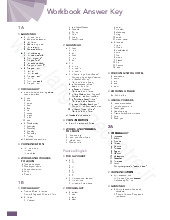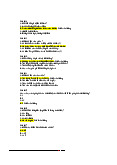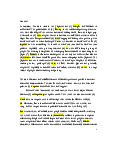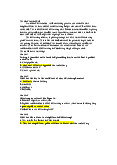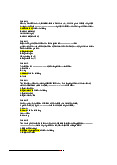









Preview text:
READING 1
1 Read the article and tick ( ) A, B, or C.
Is gossip really good for you?
That’s the question we asked some of our readers this week. Email us and tell us what you think. Lesley Hartley, age 25
‘There’s a boy in my class at university who I really like. He’s called Tony. I was too scared to
ask him out. I told my best friend Alice this secret. She said she wouldn’t tell anyone. Alice
couldn’t keep the secret, though, and she gossiped to her other friends. Of course, her friends
told Tony! Fortunately for me, the gossip was actually a good thing. Tony waited for me after
class one day. He told me that Alice’s friends had gossiped about me. And then he invited me to
go out to the cinema one night. We’ve been together since then! I think people are probably
programmed to gossip. We need to gossip to build connections with other people.’ James Goodman, age 35
‘Unfortunately, I think gossiping is in our genes. And I don’t think it’s a positive thing. People
gossip to make themselves feel more important. They don’t think about the effect it has on the
people they gossip about. For example, one of my neighbours gossiped about me after I
divorced my wife. She said that I had treated my wife badly. Another neighbour told my work
colleagues that my wife was going to move to Germany with the children. These are both lies.
I’ve found it difficult to meet someone else because people believe the gossip, not me.’ Eric French, age 28
‘We shouldn’t feel guilty about a bit of gossip. I believe that gossiping is good for you. We are
people, and people enjoy sharing news – both good and bad – so that they can form and
improve their social relationships. I’ll give you an example ... I’m quite shy and I don’t make
friends easily. My girlfriend told me that I didn’t go out enough, and that I should have a better
social life. She complained about this to her best friend, Susan. Then, one night, I got a phone
call from Danny, Susan’s boyfriend. He asked me to go out with him to see a band. I had a
brilliant night. Since then, Danny and I have seen a band every week. He’s a good friend now and I feel much happier.’
Example: Lesley told her best friend _____. A a lie B a secret C some gossip
1 Lesley started _____ Tony after Alice gossiped to her friends.
A going to the cinema with B going to class with C going out with
2 Tony waited for Lesley _____ one day.
A after class B after work C after the cinema
3 James thinks people gossip because they want to _____. A feel more positive B look more important C feel more important
4 James’s neighbours told _____ about him. 1
A funny stories B lies C secrets
5 Eric thinks that gossip improves _____ relationships.
A old B social C working
6 Eric has _____ because his girlfriend gossiped.
A made a new friend B made a big mistake C met a new neighbour 6
2 Write L for Lesley, J for James, or E for Eric.
Example: I liked a boy in my class. L 1 I went to see a band. E
2 I think people are programmed to gossip. L
3 I’ve found it hard to meet a new partner. J
4 I don’t make friends easily. E 5 I’m divorced. J
6 I was too frightened to ask someone out. L
7 I think gossiping is a negative thing. J 8 I went to the cinema. L
9 I think people enjoy sharing gossip. E Reading 2 READING
1 Read the article and tick ( ) A, B, or C. Everyone’s a winner
Our discussion in Live Sport this week is how to be a good loser. Rebecca Coleman is a
hockey umpire. She describes some losers’ reactions, and how bad losers can learn to react positively.
How do you react if you lose a rugby match? What do you do if you are last in a race? If you
react positively when you lose, you are a good loser. If there were more sportspeople like you,
my job would be a lot more enjoyable. I’m a school hockey umpire and I’m going to list a few of
the reactions I’ve seen during hockey matches this week.
1 A 15-year-old boy missed a goal, insulted me, and hit another player.
2 A 12-year-old girl threw down her hockey stick and began to cry after her team lost the match.
3 A 17-year-old boy lay on the grass and refused to shake hands with the other team after they won the match.
4 A 14-year-old girl kicked an opponent who ran past her and scored a goal.
5 A 16-year-old boy was emotional after losing a match. He left the club and hasn’t come back.
Of course, these are only a few of the negative reactions I’ve seen. In my opinion, there are far
too many bad losers in school hockey. And they spoil the match for the other players. 2
So, how can bad losers learn to be good losers? Well, the first thing to remember is that sport is
like life. You can’t win all the time. And if you lose, you have to make sure you lose with dignity.
Secondly, if your opponent scores the winning goal, learn from him. What did he do that you
could try? Thirdly, losing doesn’t always mean you played badly. Maybe the other team was just
too good. You have to accept that sometimes you lose even if you play well. Fourthly, don’t
blame your defeat on someone else. And finally, remember that taking part in sport is more
important than winning. Think of the other advantages of playing, and don’t focus too much on the result.
Example: You are a good loser if you react positively after losing in your sport. A True B False C Doesn’t say
1 The writer gives examples of good losers she has seen this week. A True B
False C Doesn’t say
2 The 15-year-old boy said something bad to the writer. A True B
False C Doesn’t say
3 The 12-year-old girl said sorry to the writer.
A True B False C Doesn’t say
4 The 17-year-old boy lay down after the match. A True B False C Doesn ’t say
5 The 14-year-old girl was angry because her opponent went past her and scored. A True B False C Doesn’ t say
6 The 16-year-old boy is going to play in next week’s match.
A True B False C Doesn’t say
7 Other players are leaving hockey clubs because there are too many bad losers. A True B False C Doesn’t say
8 The writer says that life and sport are very similar. A True B False C Doesn ’t say
9 The writer says that if you lose, you have played badly.
A True B False C Doesn’t say
10 The writer says that you should focus on winning.
A True B False C Doesn’t say 10
2 Read the article again and answer the questions.
1 How did the 16-year-old boy feel after the match?
A 16-year-old boy was emotional after losing a match. He left the club and hasn’t come back.
2 If you lose, how should you do it?
If you lose, you have to make sure you lose with dignity.
3 If your opponent scores the winning goal, what should you do?
If your opponent scores the winning goal, learn from him.
4 If you lose, who should you blame your defeat on?
Don’t blame your defeat on someone else.
5 According to the writer, what is more important than winning?
Don’t blame your defeat on someone else. 3 Reading 3 READING
1 Read the article and tick ( ) A, B, or C. The best inventions
This week in Inventor’s World, we asked one reader, Ben Cross, aged 25, to tell us which
inventions he thinks have changed our lives the most. Which inventions did he choose? Do you agree with him?
I work in IT, so I have a close relationship with electrical gadgets! In my opinion, one recent
invention that has changed our lives is the laptop computer. It allows us to work anywhere,
and has made our working lives so much easier. The idea for the first laptop was created by
Alan Kay in 1968. Kay wanted to make a personal computer for children to learn computer
skills. It was known as the Dynabook. In fact, the Dynabook was never built. But his idea was
used by other companies to develop laptops and PCs. The first portable computer in the shops
was made by Osborne Computer Corporation in 1981. It was called Osborne 1. I’m too young to
remember all this, but my boss told me that the first laptops were very heavy and difficult to
carry around. I can’t imagine life without my laptop. What did people use to do before they were invented?
It’s clear to me that another invention that has changed all our lives is the electric light bulb.
We can go out or work late in the evening and through the night, if we want to. These extra
hours mean that we can do more and be more successful. What would we do if we couldn’t go
out in the evenings because it was too dark to see? The light bulb wasn’t invented recently – it
was invented in 1879 by Thomas Edison – but I can’t think of another invention that has made
such a difference to our lives. The early glass light bulbs were made by hand. Later they were
produced by machine, and became cheaper to buy. These days, light bulbs are made in a
variety of different types and sizes. They are used in the home, at work, in cars, in torches, on
Christmas trees, and so on. Life would be very dark without them. Example: Ben works _____.
A as an inventor B as an electrician C in IT
1 The person who first had the idea for the laptop was _____. A Thomas Edison B
Alan Kay C Osborne Computer Corporation
2 The inventor of the laptop wanted to make a PC for _____. A himself B his friends C children
3 The Dynabook wasn’t ever _____. A built B successful C used in schools
4 The idea for the Dynabook was used by _____.
A other IT companies B schools C no-one else
5 The first laptops were difficult to _____. A open B carry C use 4
6 Ben says the electric light bulb gives us _____. A cheaper electricity B more time to do things C less work to do
7 The invention of the light bulb happened in _____. A 1976 B 1889 C 1879
8 The early electric light bulbs were made by _____. A machine B women C hand
9 Ben thinks that _____ have changed our lives more than the light bulb. A more recent inventions B no other inventions C machines
10 Nowadays, there is a _____ variety of electric light bulbs.
A bigger B smaller C boring 10
2 Read the article again. Are the sentences true (T) or false (F)?
Example: Ben works with electrical gadgets. T
1 Ben thinks that the laptop computer has made our lives easier. T
2 The first laptop you could buy was called Osborne 1. T
3 The first PC was invented in 1966. F/1981
4 The electric light bulb was invented by Stephanie Kwolek. F/Thomas Edison
5 Light bulbs are now much cheaper to produce. T Reading 4 READING
1 Read the article and tick ( ) A, B, or C. My native animals
This week in Nature Weekly, one reader from Australia, Sheila Douglas, answers our questions
about the animals in her country.
What’s the most dangerous animal in your country?
In the UK, people often ask me this question. It’s difficult to say which is the most dangerous
animal. In Australia, we have a lot of dangerous animals and insects. There are snakes,
crocodiles, spiders, sharks, jellyfish, and so on. You have to remember that animals can
sometimes become aggressive if they get scared. So if you treat wild animals with respect, you should stay safe.
Are you afraid of any animals or insects?
I’m actually terrified of snakes! As a child, I lived in Northern Australia with my parents. In my
opinion, the most dangerous snake there is the King Brown, which is common. It can be three
metres long and is very poisonous.
So, what would you do if a poisonous snake like that bit you on the leg? 5
If I got bitten, I wouldn’t wash the bite or suck the poison out. I’d tie something round my leg and
keep completely still. It’s important not to move if you’ve been bitten. Then I’d call for help as quickly as possible.
What’s your favourite animal?
I think it would be the koala, Australia’s most popular animal. Koalas have a soft, grey coat and
people think they look very cute. They are not very active animals – they only move around for
about two hours a day. And they eat and sleep the rest of the time.
If you could be an animal, which one would it be?
That’s easy. It’s not exactly an animal, but I’d be a Cairns Birdwing. It’s Australia’s biggest
butterfly. It lives in the rainforest and flies high up in the tops of the trees. It’s a beautiful green
and gold colour. And if I were a female Birdwing, I’d be 20 centimetres wide – that’s about 7
centimetres wider than the male.
Example: In Australia, there are a lot of dangerous animals and insects. A True B False C Doesn’t say
1 Sheila is most afraid of snakes. A True B False C Doesn ’t say
2 She thinks the least dangerous snake in Northern Australia is the King Brown.
A True B False C Doesn’t say
3 The King Brown is the longest snake in Australia. A True B False C Doesn ’t say
4 If a snake bit Sheila, she wouldn’t wash the bite. A True B False C Doesn ’t say
5 If a snake bit Sheila’s leg, she would lie down. A True B False C Doesn ’t say
6 If a snake bit Sheila’s leg, she’d walk to a hospital.
A True B False C Doesn’t say
7 Sheila’s favourite animal is the crocodile.
A True B False C Doesn’t say
8 Koalas spend most of their time eating and sleeping. A True B False C Doesn ’t say
9 If Sheila could be an animal, she’d be a butterfly. A True B False C Doesn ’t say
10 The female Cairns Birdwing is prettier than the male. A True B False C Doesn’t say 10
2 Read the article again and answer the questions.
1 Why do animals sometimes become aggressive?
that animals can sometimes become aggressive if they get scared.
2 What should happen if you treat wild animals with respect?
if you treat wild animals with respect, you should stay safe. 6
3 Where did Sheila live as a child?
She lived in Northern Australia with my parents.
4 What do people think about koalas?
People think they look very cute.
5 What size is the female Cairns Birdwing?
Be 20 centimetres wide – that’s about 7 centimetres wider than the male. Reading 5 READING
1 Read the article and tick ( ) A, B, or C. Survivors
This month our travel editor interviewed three people who survived a natural disaster. Here are their stories. Linda Burrows, age 31
‘I got divorced last year and decided to buy a ticket to New Zealand. It was an impulse, but I just
wanted to go for it and enjoy this once in a lifetime trip. I spent two fantastic weeks there. At the
end of my trip, I was leaving the hotel to go back to the airport when the earthquake struck. I
was very frightened and I saw some terrible things. I stayed there for three more days. The
situation was desperate. I realized I was very lucky to get home safely. If I ever see New
Zealand on the TV, I immediately have to watch something different. I hope things will get better for me in the future.’ Klaus Roski, age 21
‘My wife and I were on our honeymoon in Thailand when the tsunami happened. We were
swimming in the sea and then everyone was running to the beach. We followed them, because
we could see that something strange was happening. We climbed some stairs and went into a
tall building behind the beach. We did the right thing and for some reason we were lucky; other
people were not. We’ve been together for eight years now. If we talk about the tsunami, it helps
us to understand our feelings about it.’ Andy Peters, age 26
‘My brother works as a pilot in Canada and earns a lot of money. Last year he sent me a ticket
to Vancouver. So I went there to visit him. We were having a great holiday until we saw the
news on TV one night. There were big forest fires near us and there was a lot of smoke. My
brother got a phone call and went to fly a military plane to put water on the fires. I was really
worried about him, but he arrived back safely. And I got home safely, too.’ 7
Example: Linda went to New Zealand after she got ______. A ill B divorced C married
1 The _____ happened when Linda was leaving the hotel. A tsunami B cyclone C earthquake
2 She stayed in New Zealand for _____.
A two weeks B seventeen days C four weeks
3 She finds it very difficult to _____.
A watch TV programmes about New Zealand B talk about what happen ed C think about the future
4 Klaus and his wife were _____ when the tsunami happened. A in the water B running C sunbathing
5 They could see that something _____ was happening. A frightening B unusual C surprising
6 They escaped by going into a building near _____. A the houses B the hotel C the beach 7 Andy’s brother ______.
A flies planes B works in the forest C is a soldier
8 Andy’s brother bought Andy _____.
A a holiday B his flight to Canada C flying lessons
9 Andy and his brother first saw the forest fires _____. A from the car window B on the Internet C on television 9
2 Read the article again and answer the questions.
1 How did Linda feel after the disaster struck?
I realized I was very lucky to get home safely.
2 What does Linda do if she sees New Zealand on the television?
If I ever see New Zealand on the TV, I immediately have to watch something different.
3 Why were Klaus and his wife in Thailand?
He and his wife were on our honeymoon in Thailand
4 How long have Klaus and his wife been together?
They’ve been together for eight years now.
5 What did Andy’s brother do to help put out the forest fires?
His brother got a phone call and went to fly a military plane to put water on the fires.
6 How did Andy feel about the situation?
I was really worried about his brother. Reading 6 READING
1 Read the article and tick ( ) A, B, or C.
Making a good impression on the parents 8
Meeting your partner’s parents for the first time can be stressful. We interviewed three people
who survived! Here is their advice. Rhonda Smith, age 26
‘I was really nervous the first time I met my boyfriend’s parents. Looking back, there was nothing
to worry about. They wanted to know everything about me, so they asked me a lot of questions.
I tried not to give my views on politics or controversial subjects, though. Of course, you have to
be yourself, so if they ask you a complicated question, you have to give an honest answer. One
other piece of advice I would give is: be punctual. Parents always hate people arriving late.’ Will Mansell, age 29
‘My advice is ‘dress to impress’. I wore a suit to meet my girlfriend’s parents for the first time. I
think it really made a good impression. They didn’t want their daughter to go out with someone
who wore an old T-shirt and jeans. Make sure you shake her father’s hand firmly. This shows
that you aren’t a weak man. I also offered to help my girlfriend’s mother in the kitchen. She liked
that. Lay the table, or do the washing up, for example. Her mother will think you’re great!’ Bob Tate, age 30
‘I think the most important thing is to show your girlfriend’s parents that you have a deep interest
in her. You can do this by asking questions about when she was a little girl. Parents never get
tired of talking about their children. This tactic also makes you more relaxed, because you aren’t
talking about yourself. Before you go to their house, ask your girlfriend what her parents like
doing. If you find some common interests, conversation will be easier.’
Example: Rhonda says you have to be yourself. A True B False C Doesn’t say
1 Rhonda’s boyfriend’s parents didn’t ask her any questions. A True B False C Doesn’t say
2 Rhonda says it’s OK to arrive a little late. A True B False C Doesn’t say
3 Will thinks wearing old jeans gives a bad impression. A True B False C Doesn’t say
4 Will helped with the cooking at his girlfriend’s house. A True B False C Doesn’t say
5 Will says talking about work gives a good impression. A True B False C Doesn’t say
6 Will thinks it’s important to shake the father’s hand. A True B False C Doesn’t say
7 Bob says it’s more relaxing to talk about yourself. A True B False C Doesn’t say
8 Bob thinks you must eat everything her mother gives you. A True B False C Doesn’t say
9 Bob says you should find out about her parents before your visit. A True B False C Doesn’t say 9 9
2 Write R for Rhonda, W for Will, or B for Bob.
Example: There was nothing to worry about. R 1 I was really nervous. _____
2 I offered to help in the kitchen. _____
3 Conversation is easier if you have common interests. _____
4 Parents love talking about their children. _____ 5 I wore a suit. _____
6 I didn’t talk about politics. _____ 10
